Mariano Macri, the ex-president’s younger brother, spills it all out.
"Marketing has sold Mauricio Macri as somebody who he is not: the real one is this brother of mine, the cheating partner, the politician who does not keep his promises. His conduct was enormously destructive, authoritarian, arbitrary and perverse," he declares.
"Mauricio Macri handles himself thus – either you submit or he destroys you, there is this friend or foe approach to everything he does,” says Mariano, who hit the headlines in October 2020 after the publication of Santiago O’Donnell’s book Hermano, which featured interviews with the businessman about his life, his relationships with his wider family and especially, Argentina’s former president.
"I’ve seen Mauricio in action, that’s why I don’t believe him when he says he acted transparently with the judicial system," concludes Mariano.
Were you the son with the best relationship with your dad Franco?
I was the one who spent the most time with him over the years, despite his spending so much time abroad. I was his ear to the world in his life.
Why that particular relationship?
Because of my character and my admiration.He seemed to me somebody worth listening to. With patience I knew that he would answer my questions without even asking them. I just had to wait.
Did you discuss politics at home?
No, not at all. My father was always a businessman and a man of action who wanted things to move ahead, business to go well and the country to move forward. He always gambled on whatever government was in power doing things well.
Franco died on March 2, 2019. What was the manner of his passing?
Terrible. His last 11 years included a lot of suffering and sadness. I saw him in anguish over this confrontation with his oldest sons, a conflict taken to court by lawyers. A power play of which he wanted no part. In time I realised how far it had gone and how it affected him irreparably. After he told me time and again that they wanted him declared insane and when I cleared that hurdle of also being involved and blamed despite not wanting to enter into that conflict from the start, I finally understood. I understood his pain due to the level of the dispute.
At one point your elder brothers Mauricio and Gianfranco claimed that your father could no longer continue administering his assets due to his cognitive deterioration and they declared him insane. What can you say about that moment?
They tried, they tried to go down that road. It affected my father very deeply.
What year was that?
The confrontation began in 2007 when my father decided to step aside and relinquish the leadership of the group. The devil was in the detail of the terms. I didn’t get involved until many years later.
Chatting to my brothers, my position was: “If we are going to get into a fight with our father, it’s only going to escalate and we know how that will end. I’d prefer to tear up all the papers at the table and start from scratch so that he can think out what he wants to do.” Following a sterile conversation, Mauricio ended up saying to me: “Whose side are you on? Are you with him or with us?” My reply was: “This way I could never agree. I don’t want to know what you want to do nor participate in it in the least. I want to stay totally out of this.”
That was after a few months of the experience of trying to reunite the brothers.
Did you try to play the role of mediator?
That’s the story of my life. I was always between the brothers, whether running the company or in discussions. Finally, there was the idea of involving my sister who was then in poor health having been undergoing sessions of chemotherapy for a long time. I tried patiently to get her involved. She was a bit reticent and my brothers treated Sandra very badly and very impatiently. The question is that since these issues stretched out, things decided themselves in some way.
Was the declaration of insanity ever made to stick?
No. It was placed before the doctors, who found no basis for it. But I realised that those meetings were sterile because the decisions had already been taken. It was Mauricio calling the shots by telephone and general manager Roberto Maffioli carrying them out. We’re talking about a conflict of many years, a conflict which led me to take my differences to court a long time ago with many trials. It also reached a point when it began to turn into “either I get past this and resolve it somehow or my life will be over.”
When did the conflict begin?
I could roll back the clock over 20 years. As the fruit of my studies, I proposed making it more of a family business with the accent on family so that it was not just all business. It had grown a lot to become a very large company under a small family. That discipline of a family business has come to be studied a lot. It would have permitted all the family members to be able to plan their lives, discussing the development of each one among themselves and fixing clear rules for the fundamentals. The ability to converse and define things democratically. That process clashed head-on with my brother’s power play taking things to the opposite extreme to what I would have liked – legal and family protocols all within the law. I felt that I was interpreting my father’s wishes that we could all carry on.
I remember your father [Franco Macri] coming to see around 20 years ago with a book, the last he wrote, telling me that he would be retaking the leadership of SOCMA. Would that be when the discussions over the continuity of the firm started?
That was an initiative I took as one of the sons so that the brothers could agree among themselves as to the practical life and administrative mechanisms of the group. But it spun out into the resignation of my brother Mauricio, who left to dedicate himself to Boca as from 1999 so it all came to nothing.
Mauricio came to see me around that time telling me that he would be dedicating himself to politics because as he interpreted it, his father would never let him be CEO of SOCMA. I remember the year, 1999.
I’ve come here to tell the true story, according to my experience of a person who sold himself with marketing as something he is not. He opposed the family on behalf of his power play which really came to destroy my father’s life in his last years, also sweeping me along.
His conduct was enormously destructive, authoritarian, arbitrary and perverse. For me it was a question of turning the page, making peace and saying everything which had to be said. I’m a witness to everything which happened and at peace with my conscience. I can tell my children that I did things according to a scale of values. I want to be able to look them in the eyes without remorse, fundamentally thinking of my future and finding closure for a seemingly never-ending past which I cannot manage to escape.
Did Franco one day ever tell you: “Watch out for Mauricio, who wants to pass me off as a nutcase”?
That’s what I’ve already commented to you. My father, after constantly repeating that issue, invited me to investigate a bit. I did indeed chat with my father’s medical team with the intention of sounding them out as to whether they were ready to sign a certificate. The doctor told me that he had asked my father to submit to studies in order to establish a diagnosis.
To prove the contrary.
Exactly.
Did it bother you that in one of his last interviews as president, your brother told Luis Majul: “What my father did was criminal.”?
It bothered me without a doubt because it was quite the contrary. It seems to me that he’s the one very criminally inclined. Personally I never saw my father even consider the option of committing a crime nor engage in any conduct of that type. He never entered into litigation with his partners but cut his losses in magnanimous fashion.
Is it correct that your father managed to establish a good relationship, even empathy with Néstor Kirchner when he became president?
My father reached empathy with all leaders. Both Néstor and Cristina [Fernández de Kirchner] came to admire him very much. He was a guy who joined in to carry the country forward, the kind of hero we need, like anybody running a PyME [small or medium-sized business] who hires two or three people. Those are the heroes who do the country good.
At one point he got Néstor to make an agreement with China under Hu Jintao, signing a memorandum of understanding for a loan of US$10 billion which my father pushed hard so that it could be used to remodel Belgrano Cargas entirely. This would have carried an impact of being able to take out the harvest at sufficiently low freight rates to bring hundreds of thousands of hectares into production. It is a railway line 10,000 kilometres long running through 13 provinces. He also wanted the president to build up to three nuclear power plants to resolve the problem of energy shortages. He went in for grand projects with great magnanimity.
SOCMA was inherited by Franco Macri’s five children – Mauricio, Gianfranco, Sandra, you and Florencia – each with 20 percent. Sandra died in 2014 and her 20 percent was divided among her two sons, Rodrigo and Franco, with 10 percent each. Mauricio Macri, before marrying Juliana Awada and having another daughter, ceded his 20 percent to the three children of his marriage with Yvonne Bordeu – Agustina, Gimena and Francisco – who sold that 20 percent to Gianfranco in 2017. So today SOCMA is 40 percent Gianfranco, 20 percent yours, 20 percent Florencia and 20 percent Sandra’s kids. Is that correct?
I guess so.
I suspect that your “I guess so” is because you think that Gianfranco could be representing somebody else but formally it is so.
Formally, yes. I ceased to be informed many years ago, as from 2007. I have many unknowns and unanswered questions. Part of my struggle in the courts is because of that.
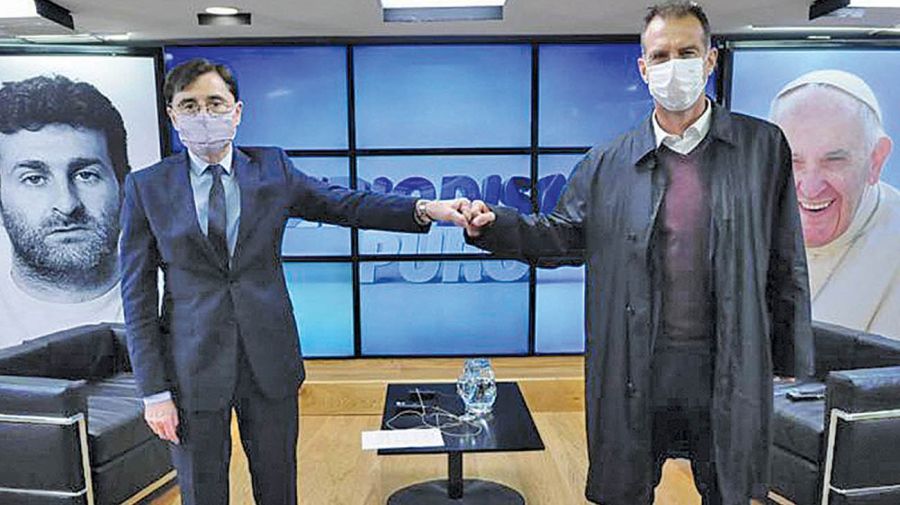
SOCMA has manufactured cars with Sevel, built bridges, gas pipelines, buildings, roads, industrial plants, electrified railways, produced films, participated in the farming sector with food factories like Canale, collected garbage with Manliba, ran an executive flight service and introduced mobile telephones with the giant Movicom. They were the country’s leading employer for a good decade, peaking between 1980 and the mid-90s, totalling some 70 different companies around those times. What remains of that SOCMA?
As my father preached, politics and business life are not compatible. He warned that more than once because he saw Mauricio heading that way. He did everything possible to keep him away from the public sector when preparing him but it happened. Politics was not compatible with the company. And the Correo [Argentino post office] confiscation was the coup de grâce to all a lifetime’s work and the start of the decline. Only a shadow of that remains.
So is it a PyME today?
Yes.
What remains exactly?
In the last few years almost all the assets have been sold. The income from that enormous sale of assets remains. Without having any information nor having participated in any document, contract or anything, when I see the balance sheet, I see less than half that money. There is some very suspicious and reprehensible conduct going on.
One hypothesis has it that as Franco grew older, he became less assertive as from the 1980s, losing his touch and hence his businesses. Another hypothesis is that he decided to divest because he saw the conflict between politics and the company. And yet another, not stemming from any decision of Franco, was that SOCMA fell victim to asset-stripping. Was it a combination of all three hypotheses or any one in particular?
There were different questions at different times. But what I have conclusively established is that the Correo [Argentino] deal was the beginning of the end. My father saw the Correo like Jeff Bezos saw Amazon – as the business of the future, but far more based on his logistical vision of investing a whole lot of money into technology. He had been divesting for some years previously in order to concentrate on that business. The confiscation of that business without any compensation deprived him of the support he had to deal with everything going on in Brazil, because the country was in default and the group had nowhere to go to cover situations of insolvency in Brazil. There were debts.
As for his own decline, I never saw him lose his lucidity in the least. You have to understand his mentality. He never feared any challenge because he knew that any government would bet on its own local businessmen to carry things forward. Because when things are going wrong for the country, the multinationals look at their Bolsa shares and pull out. They do so because they are not fighters and nor do they see any clarity in the ground rules. The local businessmen are the ones who stay because they know that any government with a reasonable outlook will lend them a hand so that they will always prevail.
It was my brother Mauricio who installed the idea that he [Franco] was not well, repeating it in so many places that the impression began to sink in. The same happened with my relationship with him. At family level, he began to repeat about his father like a mantra: “He’s the enemy.” He began to convert me into a common enemy and make everybody else follow him. He placed the rest of the family against the common enemy.
Throughout this dialogue you’ve been using the word “enemy.” Are you saying that in some sense there was polarisation in your older brother’s outlook on life?
Without a doubt, absolutely. It’s this logic of friend or foe, you’re either with me or against me. Like with his arbitrary “do what I say,” he began to use the group as an instrument for his power play. I was opposed, I disagreed. I do not want to see myself involved in anything which could place my liberty at risk or put me outside the law so that I’d have to explain to my children what I did. My refusal to be an accomplice in his manoeuvres is what made him cross the Rubicon, as he told me at one time.
Was your dad more flexible in convincing and incorporating his enemies, seeking integral solutions?
My father was the kind who builds and integrates, never antagonising. The same with governments. He never got mixed up in political discussions. He thought that over and above what any government might want to do was what it suited them to do, which was industrial growth. He was always positive and magnanimous, taking the high road out of problems, never clashes or ruptures.
You lodged a lawsuit in the commercial courts to permit you to see the books of the commission inspecting SOCMA. Why couldn’t you have access to those books?
I found out in the newspapers about the sale of the assets. That was because I stepped out of the picture in 2013. I was considered an exile. They turned off the tap on me. The same assets to be shared by us all no longer belonged to me. I didn’t receive anything, not even information.
What made you come to be “an exile”?
All the things I’ve been taking to court. SOCMA was basically a building-brick for Mauricio’s power play. Without proposing any frank dialogue, he went looking for excuses to drag us all into this situation, saying it was the only way.
The only way for SOCMA?
For us as partners of SOCMA, to resolve our problems or to save whatever. What he had already clearly told me he was doing was to await the moment in which he could use SOCMA to do business. It was not a game in which I was disposed to enter.
Your brother has also applied that phrase “the only way” to the economy where it would be applying an orthodox plan. Now why would the only way for SOCMA be to enter politics? Because there was no other alternative for SOCMA being able to recover the Correo post office?
The only way was making the group an instrument which could be arbitrarily used for his political plans.
Why would that be useful for SOCMA?
It wasn’t going to be.
What was his argument, then?
The argument was that of course he would be able to do business for SOCMA, which was not possible if in opposition to the governing party. “We’ll be able to do business,” that’s what he thought but as my father always said, you cannot mix politics and business.
Is your brother Mauricio the victim of political persecution like he says?
I would reply that when he was president or disputing power and spoke in terms of being open to dialogue and sitting down to reach agreement, I was experiencing in parallel what I was suffering within my own family. Nothing in the way of dialogue or agreements, pure imposture. Who kills by the sword, dies by the sword. I don’t know about his never having interfered in the judicial system, as he tells it. So it ends up being an eye for an eye and a tooth for a tooth. If that’s the way it is, he asked for it. But we Argentines get nothing out of it, only more poverty and a country which does not move ahead.
In other words, there could be lawfare, like Kirchnerism?
I would reply thus – I saw no need for my brother’s political power-building at the risk of exposing and involving his family. The most sensible thing would have been what my father preached – the better we preserve things, the better we sell or if we undersell, too bad but the links remain intact. I wouldn’t expose my family links for anything. If you play that way, I don’t know if I believe you if you tell me you’re playing transparently.
Mauricio is eight years older than you. Might not the age difference work against the traditional fraternal comradeship because with Gianfranco the age difference is less?
Yes, they were born in 1959 and 1962 with many friends in common. Furthermore, Mauricio was very young when he married for the first time. He left home at 21, having already performed his military service. We shared the same home for a very short time.
Mauricio Macri fought the 2015 elections with a centrist political discourse when he won and many people attribute that to Marcos Peña and Jaime Durán Barba and their ideas, but at the beginning of his career and again now, he has positions closer to the traditional right. What is his authentic political position?
I don’t know how he has evolved over the years but he clearly has evolved, in many ways very much for the worse. Everything which has happened to him has made him grow up and mature, I have no doubt about that. I don’t know if it’s political marketing, what I do know is that his inaugural speech to Congress really enthused and inspired me. It left me very much in two minds – on the family side I was experiencing these abuses and this absurd treatment, while on the other hand he had come to unite the Argentines, eradicate poverty and fight drug-trafficking. In the final analysis one realises that what counts are the actions, not the words. Everything which occurred afterwards shows that.
Do you talk to your cousin Jorge Macri?
No, I have practically no dialogue with him.
Have you got to know or held dialogue with his main political aides?
I never mixed with his entourage. I only know those who come from his adolescence and childhood and also from SOCMA.
You said: “Mauricio has a big problem – he has straw men everywhere. Now he has a serious problem in removing all doubts that what is his belongs to him, because the front men can die with their family heirs not recognising his property rights or otherwise betraying him.” And during the interview you said Mauricio was an expert in picking up businesses outside the assets of the family group. How is Mauricio’s relationship with his straw men?
Take that as something said in an intimate conversation between two people without a camera on me or many people overhearing. Afterwards it was published like that.
And what would you say today?
All I hear in the news about these cases points to manoeuvres, forms of using power and doing business, I see that logic. You ask me: “Do you know about any straw men?” I cannot supply you with any evidence. You then ask: “Do you think he has them?” I think so, that was his modus operandi. I cannot be the only one, there must be many others who think like I do, that in all those years in power he built up important slush funds. That can only be done via third parties, otherwise it’s self-incriminating.
A PERFIL investigation confirmed that various Boca ex-players were his investment partners in wind power plants - Carlos Tevez, Guillermo Barros Schelotto, even Claudio Caniggia. How would you explain that?
I never stopped to analyse it. I would see that as more the need to bring investors together. Perhaps that kind of investor suits him, more trusting, less analytical.
Affecting people close to him?
He had one modus operandi, which I myself suffered – submission and destruction. He had that one way of handling people – either you submit to him or he destroys you.
Do you think he could be president again?
That’s one of the worries which leads me to say: Watch out, what you see is not what you get. Then everybody will just have to be responsible for their vote but he is a person whose power was destructive. He didn’t know how to use power. His book is entitled ‘Primer tiempo’ (“First Half”) – maybe he believes that there will be a second. Today he is a very big heavyweight in politics. I don’t want that for my country, I want honest people. He should not say that he speaks the truth and then tell one lie after another.
You put in your Twitter account: “This is my only official account. I open it in order to be able to tell things which are important for me and perhaps public life.” Apart from closing a chapter, is public life also important to you?
I do it for my children. I need to turn the page and get this out of my system. I do this instead of choosing to stay mum, the easy way out, which is no solution either. I prefer to pluck up the courage to expose myself and my point of view. I’m betting on speaking out in public as helping me to get this out of my system by unmasking Mauricio and telling what kind of person he is. Then I will be at peace.
I’ve said what had to be said, holding nothing back. And perhaps there are few people in my position to be able to do it as a brother can. I’m sure that in many walks of daily life there are people who have undergone situations similar to mine, of abuse on his part – I hope they speak out. They probably won’t speak out of fear of losing something.
I have nothing to lose. Everything I had to lose, I’ve already lost. I’ve lost my family ties, which I valued greatly. I always tried to unite us all insistently. I watched all my nephews and nieces grow up. My brothers involved them in this dispute – something which I did not do with my own children– and they did not preserve them.







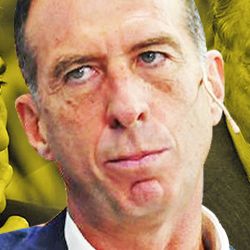

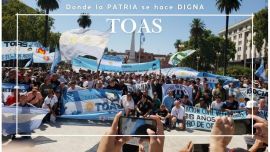






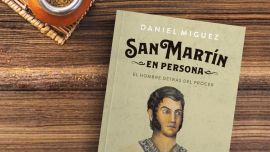
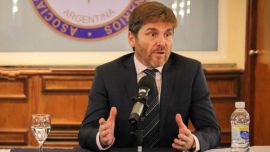



Comments